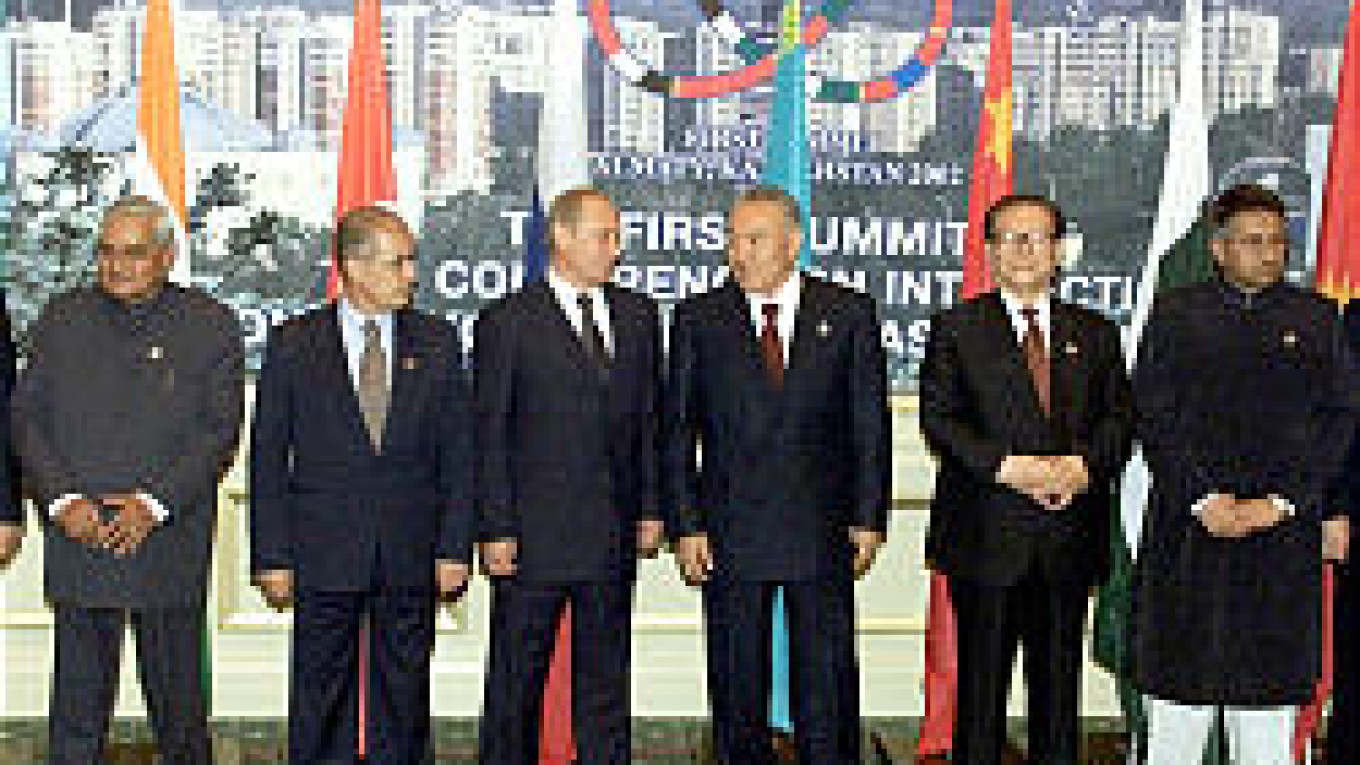Asked to state Pakistan's nuclear policy and explain why it will not renounce first use of nuclear weapons as India has, Musharraf said, "The possession of nuclear weapons by any state obviously implies they will be used under some circumstances."
President Vladimir Putin pressed India and Pakistan to enter face-to-face talks Tuesday to prevent the Kashmir conflict from exploding into a fourth full-scale war between the nuclear-armed neighbors. Although the effort failed to bring Musharraf and Indian Prime Minister Atal Bihari Vajpayee together for a direct meeting, Musharraf said he had accepted an invitation from Putin for talks in Moscow.
The timing of the proposed meeting, however, was vague and it wasn't even clear whether Vajpayee would agree to go.
Despite worldwide fears of nuclear conflict, Musharraf said it would be irresponsible for a leader to discuss nuclear war, and that Pakistan's "deeper policy" is for denuclearization of South Asia.
Earlier Tuesday at an Asian summit in Almaty, Vajpayee said, "Nuclear powers should not use nuclear blackmail." On Monday, the Indian Defense Ministry had said India "does not believe in the use of nuclear weapons."
On Tuesday morning, the leaders of India and Pakistan angrily blamed each other for more than five decades of conflict, exchanging stony stares across a table while their troops fired at each other in the disputed Kashmir region.
"India is continually threatening Pakistan for an attack and also refusing dialogue," Musharraf said after meeting with Putin. He said he didn't know whether Vajpayee, who also met Putin shortly afterward, would come to Moscow for talks.
"Everyone was desiring a meeting between me and Mr. Vajpayee," Musharraf said. "I think the whole world is disappointed that we two did not talk and meet here."
Vajpayee said Tuesday he is willing to have a dialogue with Pakistan, but there must be a halt first to cross-border terrorism, which India says is carried out in its part of Kashmir by Pakistan-based Islamic militants who have been fighting for 12 years.
After meeting both leaders, Putin said they showed "positive signs" and that neither intends to use force to solve their problems. India had repeated its policy of no first use of nuclear weapons, Putin said earlier, while Musharraf has "said on the territory of Pakistan there won't be militants. This is what the whole world eagerly awaited from the two leaders."
Earlier Tuesday, as Musharraf sat about five meters across from the Indian leader at a horseshoe-shaped table in Almaty, Musharraf insisted his country didn't want the conflict to erupt. "We do not want war. If war is imposed on us, we will defend ourselves with the utmost resolution," he said. "The people of South Asia continue to pay a heavy price for the refusal by India to resolve the Kashmir dispute in accordance with resolutions of the United Nations and the wishes of the Kashmiri people."
In response, Vajpayee rejected Musharraf's repeated assurance that "Pakistan will not allow its territory to be used for any terrorist attacks outside or inside its boundaries."
Vajpayee said violence in India's portion of Kashmir and infiltration of Islamic militants from Pakistani territory had not decreased since Musharraf first made that assurance Jan. 12.
"We have seen in the following months that cross-border infiltration has increased, violence in Jammu and Kashmir has continued unabated and terrorist camps continue to operate unhindered across our borders," Vajpayee said. "We have repeatedly said that we are willing to discuss all issues with Pakistan, including Jammu and Kashmir," he said of India's northernmost state. "But for that, cross-border terrorism has to end."
Vajpayee and Musharraf both sat with pursed lips and stony stares as the other spoke. With the 14 other delegates, they signed a declaration condemning "all forms and manifestations of terrorism" and promising "to strengthen cooperation and dialogue."
When delegates mingled and greeted each other as the conference ended, the two stood on opposite sides of the room and did not interact.
Vajpayee and Musharraf met separately with several of the leaders at the summit, including Chinese President Jiang Zemin.
"We cannot but be concerned about the explosive situation in the relations between Pakistan and India, which threatens to destabilize the situation in the whole Eurasian continent," Putin said, adding that world leaders would make every effort to defuse the crisis.
A Message from The Moscow Times:
Dear readers,
We are facing unprecedented challenges. Russia's Prosecutor General's Office has designated The Moscow Times as an "undesirable" organization, criminalizing our work and putting our staff at risk of prosecution. This follows our earlier unjust labeling as a "foreign agent."
These actions are direct attempts to silence independent journalism in Russia. The authorities claim our work "discredits the decisions of the Russian leadership." We see things differently: we strive to provide accurate, unbiased reporting on Russia.
We, the journalists of The Moscow Times, refuse to be silenced. But to continue our work, we need your help.
Your support, no matter how small, makes a world of difference. If you can, please support us monthly starting from just $2. It's quick to set up, and every contribution makes a significant impact.
By supporting The Moscow Times, you're defending open, independent journalism in the face of repression. Thank you for standing with us.
Remind me later.


